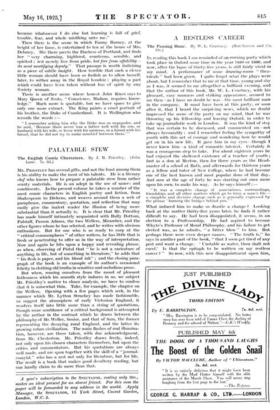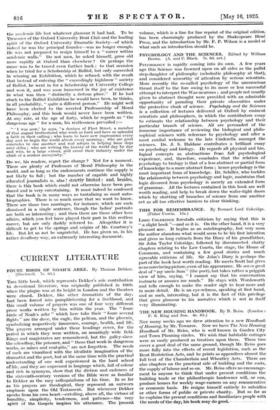A RESTLESS CAREER
IN reading this book I am reminded of an evening party which
took place in Oxford some time in the year 1889 or 1890, and now, after the lapse of thirty-five years, is still fairly vivid in my mind. A performance of some drawing-room " thea- tricals " had been given. I quite forget what the plays were
about, but I remember that to me at that time, young and shy as I was, it seemed to me altogether a brilliant evening, and that the author of this book, Mr. W. L. Courtney, with his pleasant, easy manners and striking appearance, seemed to me then—as I have no doubt he was—the most brilliant man in the company. It must have been at this party, or soon
after it, that I heard the surprising news, which no doubt impressed the scene of the party on my mind, that he was throwing up his fellowship and leaving Oxford, in order to take up journalistic work in London. It was the kind of step that was certain to be dismissed, and commented on—not always favourably ; and I remember feeling the sympathy of youth with this act of courage and wondering how he would get on in his new life. It gave him in my eyes—though I never knew him—a kind of romantic interest. Certainly it was a courageous step to take. For about eighteen years he had enjoyed the sheltered existence of a teacher of youth ;
first as a don at Merton, then for three years as the Head- master of a school at Bath, and afterwards for thirteen years as a fellow and tutor of New College, where he had become one of the best known and most popular dons of that day. And now at the age of forty he was starting out once more
upon his own, to make his way. As he says himself:-
"Itwas a complete change of associations, surroundings, friendships and all other matters which go to form a man's life— a complete and decisive change such as is generally expressed by the phrase burning the bridges behind you.' "
What induced him to make so drastic a change ? Looking back at the matter thirty-five years later, he finds it rather difficult to say. He had been disappointed, it seems, in an election to a Professorship. He had aspired to become
Whyte's Professor of Moral Philosophy, and his failure to get elected was, as he admits, " a bitter blow " to him. But perhaps there were even deeper causes. " The truth is," he says in another part of the book, " that I soon get tired of any
post and want a change. Unstable as water, thou shalt not excel.' Is that the epitaph to be written on my restless career ? " So now, with this new disappointment upon him, the academic life lost whatever glamour it had had. To be Treasurer of the Oxford University Boat Club and the leading spirit of the Oxford University Dramatic Society—of which indeed he was the principal founder—was no longer enough. He was not prepared to resign himself to a " career within academic walls." Do not men, he asked himself, grow old more rapidly at Oxford than elsewhere ? Or perhaps the cause was to be traced even further back : to that occasion when he tried for a Scholarship at Balliol, but only succeeded in winning an Exhibition, which he refused, with the result that instead of entering the " exceedingly highbrow " society of Balliol, he went in for a Scholarship at University College and won it, and was soon immersed in the joy of existence in what was then " distinctly a riotous place." If he had stuck to the Balliol Exhibition he would have been, he thinks, in all probability, " quite a different person." He might well have been elected to the coveted Professorship of Moral Philosophy, and this book would never have been written. At any rate, at the age of forty, which he regards as " the dangerous age " for a man, his restlessness prevailed :— " I was now,' he says, ' a denizen of Fleet Street, a member of that august brotherhood who work so hard and have so splendid a faith in their calling ; who learn to have new impressions every day and to begin the world afresh every morning ; who are good comrades to one another and real adepts in helping lame dogs over stiles ; who are writing the history of the world day by day and who, to a large extent, still cover their industry under the cloak of a modest anonymity."
Do we, his readers, regret the change ? Not for a moment. There are plenty of Professors of Moral Philosophy in the
*World, and so long as the endowments continue the supply is not likely to fail ; but the number of capable and highly educated journalists is, alas ! strictly limited and, besides, there is this book which could not otherwise have been pro- duced and is very entertaining. It must indeed be confessed
that the book is in many ways as tantalizing as most auto- biographies. There is so much more that we want to know.
There are those two marriages, for instance, which are each dismissed in a single sentence, though the ladies' portraits are both so interesting ; and then there are those other love affairs, which you feel have played their part in this restless career, but are only darkly referred to. Altogether it is difficult to get to the springs and origins of Mr. Courtney's life. But let us not be ungrateful. He has given us, in his rather desultory way, an extremely interesting document.











































 Previous page
Previous page